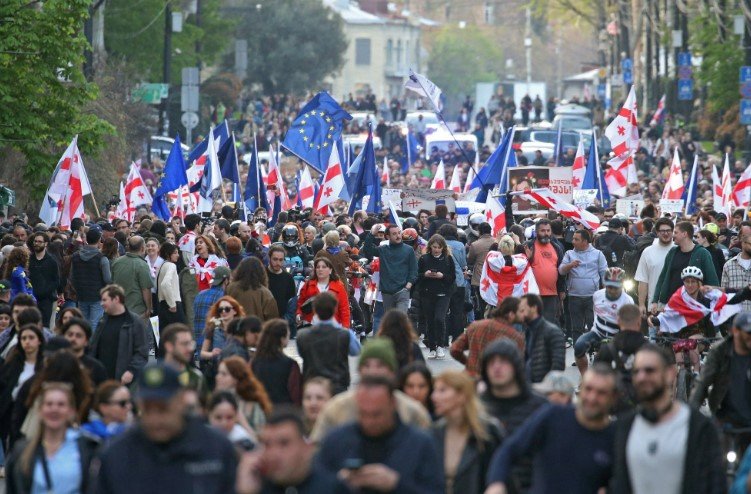In the heart of Georgia’s vibrant capital, Tbilisi, a surge of civic activism has taken hold. Citizens from diverse backgrounds have united in a powerful display of democratic expression, rallying against the reintroduction of a controversial law reminiscent of Russian influence. This law, previously shelved by the ruling party amidst widespread protests, has once again stirred the public’s fervor, prompting a series of organized demonstrations along Rustaveli Avenue, the city’s central artery.
The Spark of Dissent
The reintroduction of the ‘Russian law’ has ignited a firestorm of opposition. The law, which aims to increase transparency of foreign influence, is seen by many as a thinly veiled attempt to suppress civil liberties and align with Russian legislative practices. The first wave of protests saw a determined crowd, banners in hand, echoing chants for European integration and denouncing the law’s revival.

The second wave of demonstrations was marked by an increase in both numbers and intensity. Organizers, leveraging social media and grassroots networks, mobilized a vast assembly of protestors. They stood, a sea of determined faces, outside the Parliament building, their voices rising in unison to demand the preservation of Georgian sovereignty and democratic values.
The third wave brought an unprecedented level of participation. The air was thick with the spirit of resistance as the crowd swelled, spilling into adjacent streets. The collective outcry was not just a rejection of the law but a broader call to action against any form of regression on the hard-won freedoms of Georgian society.
A Nation’s Crossroads
As the protests gained momentum, the implications of the law’s potential passage became increasingly clear. Georgia, a nation at a crossroads, faced a pivotal decision: to uphold its commitment to democratic principles or to succumb to external pressures that threaten to undermine its autonomy.
The first paragraph under this subheading should discuss the historical context of Georgia’s struggle for democracy and its aspirations for European integration. The second paragraph could delve into the strategic importance of Georgia’s position between Russia and the European Union, highlighting the delicate balance the country must maintain. The third paragraph might explore the societal impact of the law, considering how it could affect the everyday lives of Georgian citizens and their perception on the global stage.
The Echo of Solidarity
The protests in Tbilisi have resonated far beyond Georgia’s borders, drawing international attention and solidarity. The first paragraph here could describe the global reaction to the protests, including statements of support from European leaders and human rights organizations. The second paragraph might examine the role of the Georgian diaspora in amplifying the message of the protestors. The third paragraph could reflect on the potential ripple effects of these demonstrations on other post-Soviet states grappling with similar issues.
